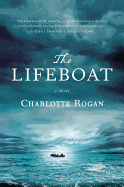
Charlotte Rogan's debut novel, The Lifeboat, set two years after the sinking of Titanic, confronts its well-mannered castaways with a briny knot of survival choices. Rogan adds a half hitch of ambiguity to her moral snarl by giving over the telling to a single passenger, Grace Winter, a newlywed who reaches New York only to find herself charged with a capital offense. This is no spoiler: The Lifeboat's prologue reveals that Grace will write her story at the behest of her lawyers, on the chance that her explanation of what happened after she and 38 other passengers were launched onto the Atlantic in a fatally overloaded 23-foot cutter will be useful in her defense. The reader's suspense derives from absorbing Grace's version of the events on Lifeboat 14 while anticipating her trial for murder.
The ballast and the beauty of The Lifeboat reside in Grace's diaristic reconstruction of the 21 days before the survivors are rescued, an account that is by turns horrifically pragmatic, evocatively poetic and psychologically intricate. Writing in linked clauses in a straight-backed tone that convincingly simulates a ladylike education circa 1914, Grace makes no obvious effort to minimize her role in the alleged crime, yet she slips between the collective third-person voice of action and the first-person voice of emotion, while also forming distinct judgments about the motives of others. The reader must judge whether Grace's flashbacks to her courtship and her commentary on the lifeboat power struggles are self-serving or accidentally revealing.
Whatever the reader's verdict, The Lifeboat remains an atmospheric and thought-provoking journey through post-Edwardian female power strategies and timeless shipwreck ethics. --Holloway McCandless, blogger at Litagogo: A Guide to Free Literary Podcasts

